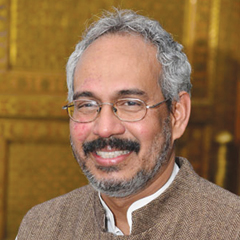 HE Jeeva Sagar
HE Jeeva SagarGood morning distinguished guests, thank you for joining me at the embassy early in the morning on a working day, to be part of the celebration of this important day - the one-fiftieth Birth Day of Mahatma Gandhi, which is also the UN-declared International Day of Non-violence. On behalf of my colleagues and my own behalf, I extend a very warm welcome to all of you.
Last evening, as I sat down and was trying to collect my thoughts to prepare my brief remarks for this morning, I expected that it would be an easy task. After all, Gandhi is a household name in India. Every child, after learning how to utter 'mommy and daddy', 'Gandhi' is the first proper noun he/she is taught. So I thought it would probably take an hour or two to get my thoughts organized. But very quickly I realized it's going to be a giant of a challenge! Thus went my dilemma - How can I grasp the personality of a man into linguistic idioms and phrases, whose Silent Resistance spoke more eloquently than the ripping sounds of thousands of guns and cannons!
Should I call him the greatest leader that India has produced?
Then I remembered how one of my foreign Ambassador friends exhorted me in my previous posting, 'Jeeva, how can you reduce a global leader into the territorial confines of India alone?' Should I say he is one of the 'Finest Statesmen' of our times? Surely he is, but a statesman may not necessarily be a mass-leader. Gandhiji has effortlessly combined statesmanship with massive popularity, not just in India but beyond its borders!
Shall I then call him the 'Darling of the Masses'?
Certainly he is! But what about the adoration and accolades hereceived from the world leaders! May be I should restrict myself to calling him a 'Man of Peace and Messenger of Non-violence'. Indeed he is! But would peace and non-violence explain Gandhi's power of Truth and Ferocity of Courage against injustice and exploitation? No, I don't thinkso.
Here is a 5 foot 5 inch tall man, or shall I say short man, with a skinny frame, who told a mighty army, looking straight into their eyes: 'You can have my dead body but you can't have my obedience nor my spirit'. So, this man of peace and nonviolence is indeed a Man of Steel! If so, how do I describe Gandhi? What Metaphors or Adjectives can I use for him? Shall I repeat the words - 'Half-naked Fakir'? But how can this phrase express the pain and agony of millions of the Indian poor whose poverty
Gandhi wanted to share, and hence rendered himself naked?
Okay then, let me describe him just as India's 'Father of the Nation', who gave his life to win freedom for his country! Yes, surely he did give his life for his country, but by then India had already won its freedom. He died in the process of making and building a new India! A robust and proud India that you see today! Finally I realized that all my efforts to squeeze a phenomenon called Gandhi into literary terms, is a futile exercise.
After all, even the great Albert Einstein could only exclaim and marvel at Gandhi saying: "Has such a man ever existed in flesh and blood?" because, he felt that words would be inadequate and would fall much short in capturing Mahatma Gandhi's personality, values, courage and deeds! So, what is the befitting homage that we can pay to this Great Soul?
There is no doubt that in today's fractured and bleeding world we need Gandhi again, to steer our destinies. Since it is beyond us to bring him back to life, the best tribute we are capable of is: To invoke his spirit and blessings, asking him to give us the strength and humanity to try and follow his values and ideals to the best of our ability and collective conscience.
Thank you.
By Ambassador of India to Kuwait HE JeevaSagar










